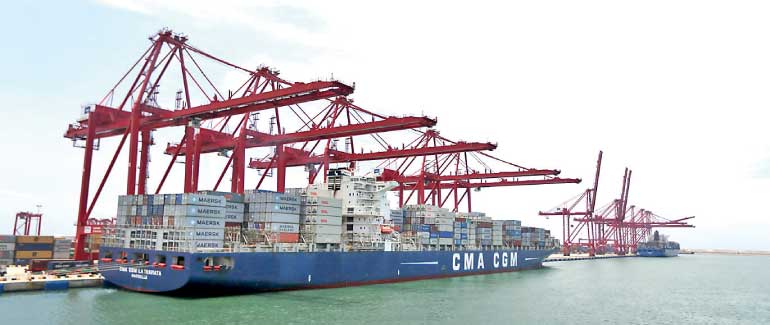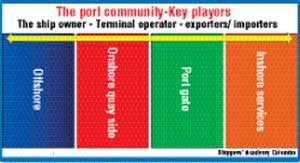Wednesday Feb 25, 2026
Wednesday Feb 25, 2026
Monday, 29 May 2017 00:02 - - {{hitsCtrl.values.hits}}
 Newly appointed Ports and Shipping Minister Mahinda Samarasinghe being congratulated by his predecessor Arjuna Ranatunga when the former assumed duties early last week following the mini reshuffle of the Cabinet - Pic by Lasantha Kumara
Newly appointed Ports and Shipping Minister Mahinda Samarasinghe being congratulated by his predecessor Arjuna Ranatunga when the former assumed duties early last week following the mini reshuffle of the Cabinet - Pic by Lasantha Kumara
Shipping is one of the global businesses that is truly transnational and plays a pivotal role in expanding and developing global trade. Being a capital intensive industry that is highly vulnerable to trade patterns not many can be players in the ship owning industry. US, Europe, Japan, China, and Scandinavia are some of the main stakeholders of the global business. Due to serious misjudgement and wrong forecast since 2008 economic slowdown the container shipping industry has been in a state of limbo as  over capacity and bad management in some cases have led to industry leaders to re design the business models, which has resulted in massive consolidation of the liner industry.
over capacity and bad management in some cases have led to industry leaders to re design the business models, which has resulted in massive consolidation of the liner industry.
As a result of rapid consolidation of shipping lines, the shipper community is rather worried that such mergers and acquisitions will lead the shipping industry to be a real oligopolistic industry that will result in unjustifiable freight rate increases and space manipulations. This will impact all developing countries, both exporters as well as the consumers. For years global shipper organisations especially in non-regulated developing markets and countries have been pointing out the anti-competitive nature of shipping when it comes to pricing.
In 2016, the Global Shippers’ Forum based in London initiated discussion with the World Bank and is in the process of talking to UNCTAD as mainly African and Asian countries continue to suffer by imposition of numerous surcharges and the breaking of freight cost by forcibly imposing charges without any transparency. As a result, a considerable number of small and medium scale industries have lost competitiveness which the Global Shippers’ Forum has identified as a barrier to trade.
On the other hand, these non-market driven tools will increase cost to the consumer when a country considers its costing for imports. It is the strong will of governments and regulators who can stop by introducing market friendly competition rules to minimise abuse of the system.
Seaports are considered as the bedrock of connectivity of global trade. Today they are challenged with the enormity of change in ship size in container vessels and resulting in the need of massive infrastructure investments to keep pace with the changing demands of such ships.
In definition, ports can be described as third-party logistics providers. One of the best definitions of a port is quoted below:
“Seaports as integrated logistics centres and multifunctional socio-economic spaces are the key components of the global transport system. They carry out the functions and services necessary for the efficiency of supply chains, and their final elements include the distribution of goods from the places of production to places of consumption. Seaports cover the transport, logistics, distribution and spatial functions, which influence city development, while logistics centres cover the distribution function.”
Ports today face two competitive challenges – the significant increase in ship size and volumes and the need for greater efficiency, ironically majority of the South Asian port are considered operating at 50%-70% of efficiency.
As described above, the port community is complicated. But, in the eyes of many it is a function between a ship and a port which is not true. However, most vital component of the port community is the community that brings in the ships (ship owners and operators) and the cargo owners (exporters and importers). In many instances, smaller Asian and African ports tend to ignore the rights of the cargo owners and ship owners whilst policy is driven by third parties. And the key elements of the supply chain are usually ignored when decisions relating to shipping and ports are developed.
A classic example of this is the port of Hambantota in Sri Lanka. Never were the ship owners nor the cargo owners were seriously consulted prior to engaging in a massive infrastructure project that is gradually swallowing Sri Lanka into a debt trap and is dragged into an unwanted cold war among major economic interest of Asia.
 Colombo International Container Terminal in Port of Colombo
Colombo International Container Terminal in Port of Colombo
Anyone with common sense is aware, that Sri Lanka’s strong point is its geography. However, if government fails to identify the right parties and right policies and doesn’t realise that shipping is a global business and its global customers are not identified as partners in development, the aspiration to be a maritime hub from a mere transshipment hub is going to be an impossible task.
For years, global policy makers, industry specialists have advocated a strong landlord model to develop the Sri Lankan port sector. The manifest of the President talks about the Tamesek Model of Singapore. The Prime Minister has repeatedly talked about a reform agenda and the importance of maritime economy. Last two budgets of the good governance government have proposed many reforms including the setting up of a Maritime Port Authority (MPA). It’s now time to establish these vital reforms if we want to be the maritime hub of South Asia.
In the national interest where the government policy is to promote exports and use the strength of the port to reduce import and export costs, it is important that policy decisions to support both trade as well as shipping is given, a fresh look. This is expected from the new authorities and the new Minister Mahinda Samarasinghe. The Government should identify the key stakeholders and their motives when they lobby with authorities as Sri Lanka’s policy has been driven by third parties in many instances since 1994. As a result, policy and implementation has been left to lip service and speeches and exporters and consumers and the country have suffered.

Sri Lanka probably has a two to five-year window to get out of the current mess it has entangled itself due to poor decisions or decisions not taken at the right time. With short and long-term reforms implemented and listening to professionals without any vested interest in the shipping and ports sector may be the last resort to safe guard the national interest which is certainly at cross-roads.
(The writer is the CEO of Shippers’ Academy Colombo, an economics graduate, and the immediate past secretary General of the Asian Shippers’ Council).